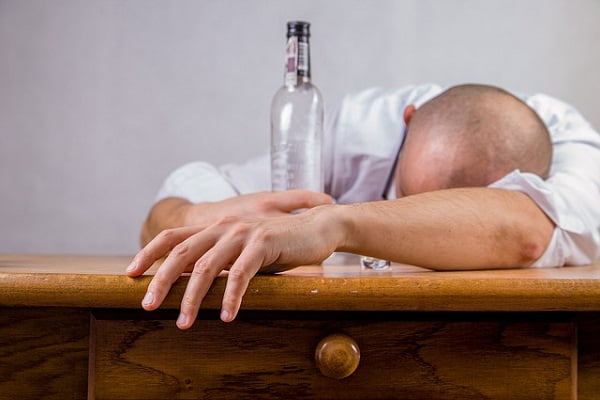Alcohol Abuse and Its Treatment
- Updated on: Jul 26, 2019
- 7 min Read
- Published on Jul 26, 2019

What is Alcoholism?
The National Institute on Alcohol Abuse and Alcoholism (NIAAA) defines Alcoholism or alcohol use disorder (AUD) as “problem drinking that becomes severe”. A person with this condition drinks in large quantities every time and does not know when or how to stop drinking. People with AUD often spend a lot of time thinking about alcohol, and they cannot control how much they consume, even if it is causing problems at home, work, and financially. Technically, alcohol abuse can be defined as an excessive or inappropriate consumption of alcohol, but not necessarily dependence. Drinking moderate amount of alcohol does not generally cause any psychological or physical damage. However, increasing the amount of alcohol intake regularly or consuming more than recommended, may result in AUD.
What Defines an Alcoholic?
An alcoholic is a person who suffers from alcoholic use disorder (AUD) or alcoholism. He is dependent on alcohol for routine functions and suffers from withdrawal symptoms without a drink. Alcoholism is a problem but many people doubt it and consider it as a choice. Non-alcoholics can stop drinking whenever they want but unfortunately this is not the case with alcoholics. Alcoholics cannot stop drinking according to their choice and even if they want, they face withdrawal symptoms.
Being an alcoholic is a big problem in itself. Alcoholic people drink without any reason at all and are in fact dependent on alcohol. Becoming an alcoholic is not something that occurs overnight. There is not any exact moment when you can contract alcoholism. Instead, it takes many years for even a heavy drinking to develop into a disorder. However, alcoholism can also begin to set in within weeks, especially if there is a binge drinking.
An alcoholic person has been categorized into different types:
- Young adult subtype
- Young antisocial subtype
- Functional subtype
- Intermediate familial subtype
- Chronic severe subtype
Young Adult Subtype
Young adult subtype includes young adult drinkers who don’t have any family history of alcoholism or some other mental illnesses.
Young Antisocial Subtype
It includes adult drinkers with a family history of alcoholism as well and an addiction to other substances and co-occurring mental illnesses.
Functional Subtype
This subtype generally involves alcoholics with a family history of alcoholism and depression. These people are usually middle-aged with good jobs.
Intermediate Familial Subtype
Such alcoholics often have a family history of alcoholism and prior depressive episodes.
Chronic Severe Subtype
This subtype includes people with a history of alcoholism, drug addiction, and mental illnesses. They are usually middle aged.
Alcohol Dependence Treatment
There is as such no cure for alcohol dependence or alcoholism. Overcoming alcohol addiction is a long process and requires both personal dedication and various treatments or therapies. A faith based addiction treatment plan depends on a patient’s personal circumstances, including his or her:
- Prior history of alcohol dependence
- Level of support from family and friends
- Personal commitment to becoming and remaining sober
- Financial situation
If you are ready to face your addiction, consult a doctor. He will likely ask you a series of questions to determine your level of addiction. These questions can also help him to determine the best treatment according to your needs. Treatments can include counseling, detoxification, or a drug and alcohol detox center. He might also want to speak with some of your friends or relatives to estimate your addiction, symptoms, and treatment opportunities.
Ideally, your doctor may recommend one or more of the following treatment options:
- Detoxification
- Behavior modification
- Counseling
- Medications
Detoxification
Most of the treatment plans start with a detoxification program usually meant to break your body’s physical addiction to alcohol. Detoxification process is often performed in an inpatient therapy treatment center or hospital. It typically lasts one week. Since the symptoms of physical withdrawal can be dramatic, you may also be given some medications to help prevent:
- Shaking
- Confusion
- Hallucinations
- Convulsions
Behavior Modification
People who abuse alcohol are often addicted to drinking, as much as the alcohol itself. For this reason, they may need to learn skills and coping mechanisms for avoiding alcohol once they leave a treatment center or return to known environments where the urge to drink may be stronger. Besides, doctor may also refer them to a counselor or other treatment programs so that they can learn skills and coping strategies.
Counseling
Sometimes, your doctor can refer you to one-on-one or group counseling. Support groups can be helpful when you are going through treatment for alcohol dependence. A support group can also help you in connecting with other people who are facing similar challenges. They can help answer questions, provide encouragement, and direct you to support resources.
Medications
Some medications have been found useful in treating alcohol addiction. They include:
Disulfiram
It is an alcohol-sensitizing drug that can lower your desire to drink by making you unwell when you drink alcohol. In combination with alcohol, it causes flushing, nausea, vomiting, and headaches.
Acamprosate
This drug can help in combating alcohol cravings by restoring the balance of certain chemicals in your brain.
Naltrexone
This drug blocks the feel-good effects that alcohol has on your brain. Without such good feelings, you may feel less inclined to drink. It is available in the form of an oral tablet or injection. For example, vivitrol is an injected form of the drug that your doctor can give you once in a month. It is more reliable and convenient than oral pills.
Overcoming alcoholism is a lifelong journey. You can often slip in and out of sobriety as you work your way through your addiction and may also face relapses and temptations for most of your life. Some people overcome alcoholism the first time they try to become sober. However, others battle alcohol dependence for years. But it should be noted that the more you try, the higher are your chances of success.
What do you Mean by Alcohol Rehabilitation?
Alcohol rehabilitation is the process of combining medical and psychotherapeutic treatments for overcoming alcoholism. The major goal of alcohol rehabilitation (both inpatient and outpatient) is for the patient to remain permanently sober and gain the psychological tools for long-term sobriety. Alcohol rehabilitation should be attended by anyone whose life, health, work or relationships are affected by chronic alcohol abuse. The aim of alcohol rehabilitation is to enable a patient to be successful in life and avoid the severe consequences that alcohol dependency can cause.
Major Goals of Alcohol Rehabilitation
Following are some of the major goals of alcohol rehabilitation for the treatment of an alcoholic person:
Goal 1: End Alcohol Abuse
This is the starting point for all other goals during alcohol treatment. Its main motive is to stop alcohol abuse.
Goal 2: Establish a Positive Support System
This is one of the important goals of alcohol rehabilitation and allows for success after the program completion.
Goal 3: Improve General Health
Improved general health is important for a healthier lifestyle and long-term sobriety. This goal is often possible during inpatient alcohol rehabilitation and can be met in the first weeks of alcohol sobriety. However, some cases of extreme alcohol abuse may require prolonged period of time to see improved health.
Goal 4: Improve Personal Circumstances
This alcohol rehabilitation goal mainly aims at giving the patient a successful future outside of the program.
Goal 5: Meet Employment and Educational Needs
This goal also aims to put the patient up for future success outside of an inpatient or outpatient alcohol rehabilitation program.
Goal 6: Diminish Criminal Behavior and Resolve Legal Problems
Rehab centers aim to remove all the negative aspects of a patient’s life in order to facilitate future success.
Goal 7: Treat Psychiatric Disorders and Psychological Problems
Alcohol rehabilitation often aims to provide treatment for specific psychological problems.
What Happens During Alcohol Rehabilitation?
An alcohol rehabilitation program involves following steps for alcohol abuse treatment:
Assessment
Upon entering alcohol rehabilitation, medical staff will screen you to assess your personal situation and create a program that is unique to you. This will mainly include a physical exam, a urinalysis drug test, a psychological screening and an assessment of personal situations. The aim is to understand the level of alcohol abuse and to create a program that will allow you to succeed.
Alcohol Detox
Alcohol withdrawal generally starts 3 to 5 hours after the last drink, but may not need anything more than a medical supervision. During the detox period of alcohol rehabilitation, you will be monitored by medical staff 24-7 to make sure that the withdrawal symptoms are not complicated or dangerous. In some extreme cases of alcohol withdrawal, medication may be given to prevent or treat seizures or DTs (delirium tremens). But in most cases, medical staff will only monitor you to ensure safety.
The Meat of the Program (Psychotherapy and Behavioral treatments)
This is one of the most important phases of rehabilitation, as it begins to give you a base for future sobriety. During this phase, you are supposed to work with an alcohol counselor to tackle your current mental and emotional condition and understand where it’s coming from. Then, you can begin to make behavioral and attitudinal changes to remain sober, prevent relapse, and start living a happy life.
Prescription Medications
Currently, pharmacotherapy for alcohol dependence is a promising and valuable tool for treatment. Some examples of medications which may be prescribed to you during alcohol rehabilitation include:
- Acamprosate
- Anti-anxiety medications
- Antidepressants
- Disulfiram
- Naltrexone
However, these treatments are often assessed on an individual basis and are implemented along with psychosocial treatment. In fact, medications work best in association with psychological and behavioral treatments.
Continuing Alcoholism Education
Education about alcohol abuse is important during alcohol rehabilitation, as it aims to hold your normal mind. Alcoholism education helps you break down the urge to drink, understand the origin of cravings, and to avoid triggers in the future.
Supportive Social Services
This is the final step of alcohol rehabilitation in which the rehab staff helps to empower a patient by connecting her/him with services outside the treatment facility in order to maintain self-denial from alcohol and begin to create a network of supportive people to influence in the patient’s life. These services mainly include housing, health care, social service, child care, or financial and vocational counseling.
What Happens After Alcohol Rehabilitation?
After alcohol rehabilitation, you will feel pretty much yourself. While aftercare is getting considerably better, it will be up to you to continue a program of rigorous attention to your inner life or not. A good alcohol rehabilitation program may always recommend you to:
- A community addiction recovery center
- Life skills training programs
- Outpatient addiction treatment
- Social services
- Transitional living
The most essential thing to think about after alcohol rehabilitation is having an aftercare program that will allow you to continue treatment and a safe environment to maintain sobriety. It is also important that you follow suggestions to help you continue to maintain constant sobriety. Some of the suggestions may include attendance at Alcoholics Anonymous, SMART recovery or another community or religious groups, addiction counseling, or living in a halfway house. After alcohol rehabilitation, it is important to have a safe environment to live in while entering back in to the normal realm of everyday life.












